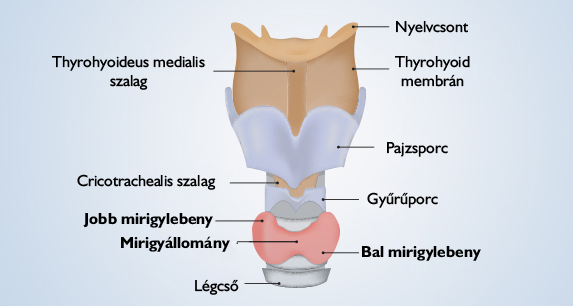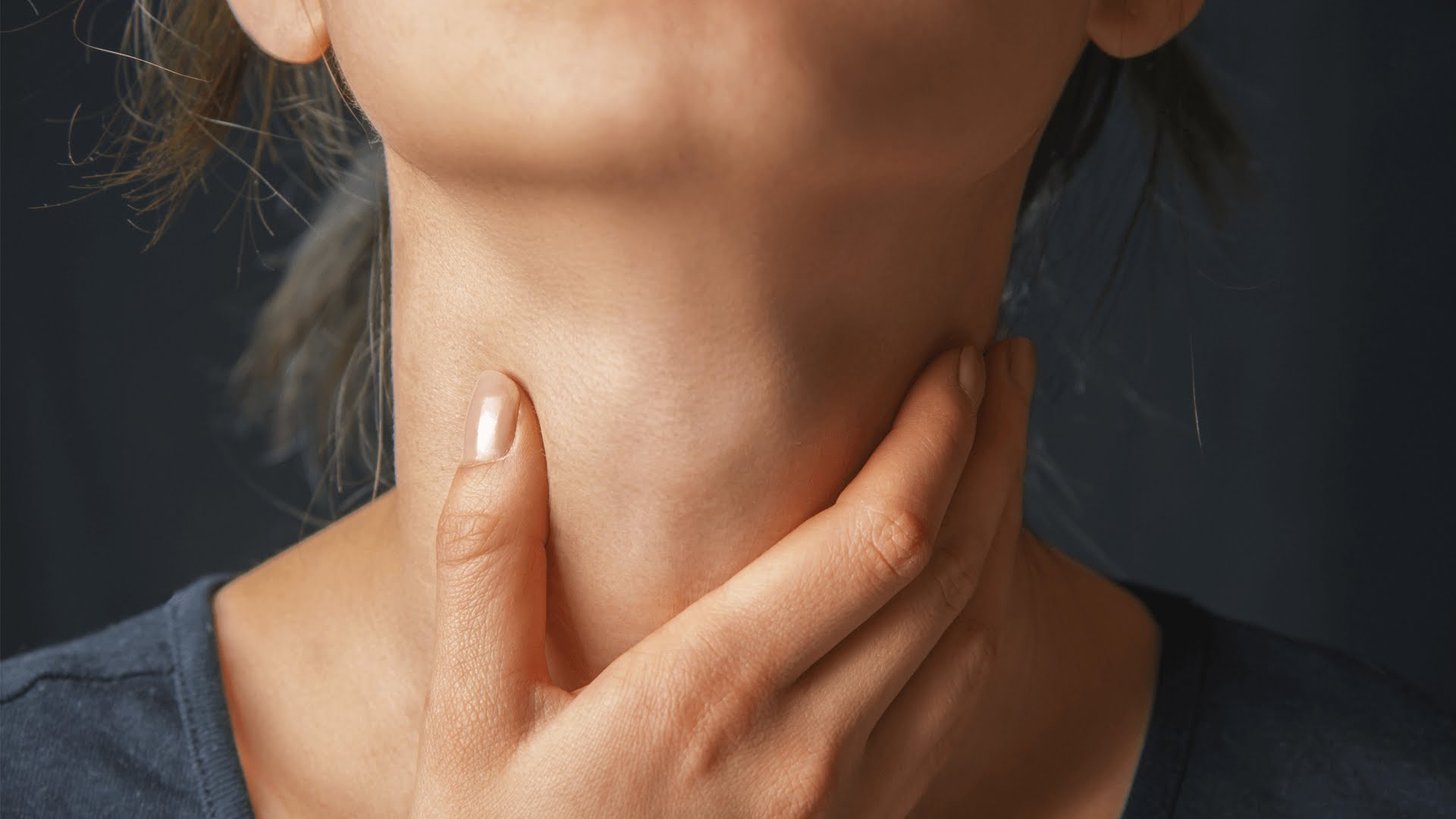Thyroid surgery, thyroid removal
Surgery is needed to treat disorders, such as a lump or swelling appearing on the thyroid. Thyroid removal is used to treat thyroid disorders such as cancer, benign thyroid enlargement (goitre), and hyperthyroidism.
Thyroid surgery is an option if the patient’s overactive thyroid gland produces too much hormone (thyroxine) and when it is not possible to treat it with thyroid drugs or radioactive iodine therapy.

What types of thyroid surgery are there?
Partial thyroid removal
When a lump, inflammation, or swelling affects only one half of the thyroid gland, the doctor removes only one lobe during thyroid surgery (thyroid lobectomy). The remainder preserves some or all of its functions.
Almost complete thyroid removal
During the almost complete thyroidectomy, the thyroid gland is removed, however, a small amount of thyroid tissue remains, which preserves certain functions of the thyroid gland. Many of those who have had this type of surgery develop hypothyroidism, but this can be easily treated with daily hormone replacement.
Complete thyroid removal (thyroidectomy)
During the complete thyroidectomy, the entire thyroid gland and thyroid tissues are removed. This surgery is necessary if lumps, swelling, or inflammation affect the entire thyroid gland, or if cancer is present. In case of complete thyroid removal, daily thyroid hormone therapy is required to replace the natural function of the thyroid gland.
How is the procedure performed?
Thyroid removal, also known as thyroidectomy, is performed under general anaesthesia. It is important not to eat or drink anything after midnight before the surgery.
The surgeon makes a cut over the thyroid gland and carefully removes part or the whole of the gland. Since the thyroid is small and surrounded by nerves and glands, the procedure can take two or more hours.
What are the benefits and risks of thyroid surgery?

Thyroid surgery can be tolerated well and has a low complication rate. The goal of the surgery is to relieve the symptoms and prevent other, more serious diseases that can be caused by an abnormally functioning thyroid gland.
As with all major surgeries, thyroid surgery carries the risk that the patient will not respond properly to the aesthetic. Other risks include infection, bleeding, weak voice, or hypoparathyroidism.
Am I fit for thyroid removal?
Complete thyroidectomy is the only option that offers an immediate cure for hyperthyroidism. Another case where surgery is the right choice for you if your hyperthyroidism is caused by a hot node. A hot nodule (also known as a toxic nodule) refers to a nodule that produces an excessive amount of thyroid hormone because it disobeys the signals emitted by the pituitary gland to stop the production of thyroid hormone.
This can result in hyperthyroidism. Depending on the location of the nodule, the surgeon may remove the lobe that contains the hot nodule. This leaves part of the thyroid gland intact, which is usually enough to supply the body with a healthy amount of the hormone.
How do I prepare for thyroid surgery?
Proper regulation of thyroid function is very important. Therefore, you and your endocrinologist will need to adjust your thyroid levels before surgery.
What should I do after the surgery?
One day after thyroid surgery, the drain is removed from his neck. A new blood test is performed to check calcium levels.
After surgery, you will most likely need a daily thyroid hormone replacement to trigger natural function and ensure proper functioning of the body. Additional blood tests will be needed to balance your hormone levels.

Why are regular check-up examinations after thyroid surgery important?
Regular post-thyroid check-ups are very important to make sure your metabolism is working properly and to monitor your medication dosage.
Convenience services
We accommodate our clients in a modern, pleasant, air-conditioned single room. Each room has a private bathroom, fridge and TV, and free WIFI access. We also provide our clients with individual nurse supervision, who will help your continuous recovery during your stay.
What is included in the price of our surgeries?
- costs of the surgery
- costs of anesthesia (local or general anesthesia, postoperative pain relief)
- the costs of the planned hospital stay and care
- necessary medicines and certain medical aids during the stay
- inpatient physiotherapy treatment (if necessary for rehabilitation)
- if necessary, the fee for the planned histological examination
- the price of the first follow-up examination
What additional costs might be expected?
- implants
- consultation with the anesthesiologist (must be done in Medicover)
- pre-operative examinations (if performed by us)
- in case of blood group antibody positivity, the blood matching fee
- hotel service fee for extra care days
- aids for further rehabilitation
- accompanying person staying in the hospital
- day (with one meal) 20 000 HUF
- night (full board) 60 000 HUF
- furthermore, if necessary, the cost of the 2nd follow-up examination is the fee of the specialist examination -50%, the cost of the 3rd follow-up examination is the fee of the specialist examination -30%
The course of the surgery
Before surgery
- pre-surgery specialist consultation, where the specific surgical proposal is made
- consultation with the Case Manager
- general information if necessary
- preparation of a written quotation
- booking surgery and preliminary examination appointments
- payment
-
carrying out pre-operative examinations
-
arrival for surgery
On the day of surgery
- arrival at Medicover Hospital at 6:30
- check-in at the reception on the ground floor
- occupying a room accompanied by a nurse, who provides information
- morning visit with the specialist physician and anesthesiologist
- surgery
- postoperative monitoring
- afternoon visit with the specialist physician
- constant anesthesiology specialist monitoring in the postoperative period
- discharge (with an accompanying person), final report and handing over a certificate
Surgical service process
- surgery
- hospital stay and care
- planned histology
- follow-up examination, sutur removal
